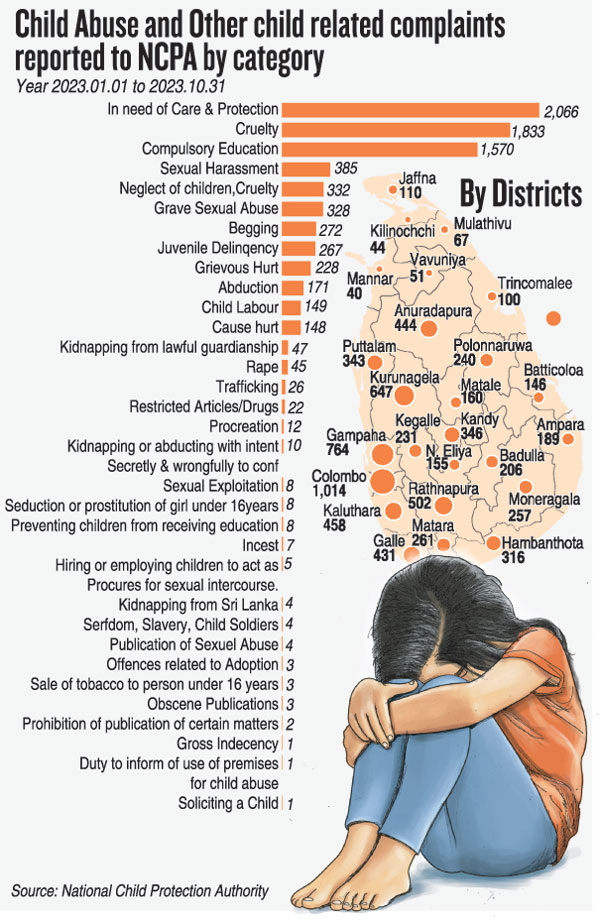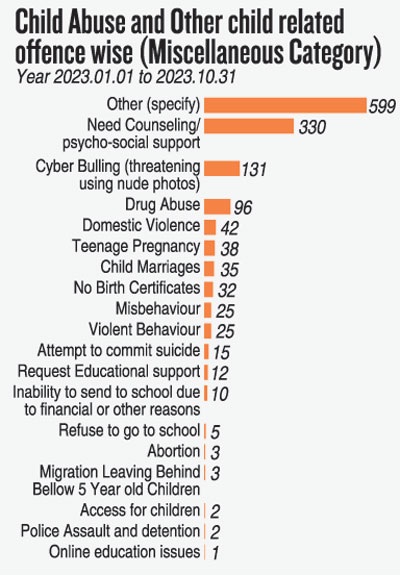News
Child abuse gallops along with economic devastation
View(s):By Renishka Fernando
Earlier in February this year, a 33-year-old father in the Godigamuwa area in Aranayaka killed his two children aged 6 and 9 over an alleged family dispute. He then committed suicide.
In September, it was reported that a 9-year-old from Mawathagama had been abused by her father.
A total of 168 rape cases of girls under the age of 16 years were reported in September, and among them 22 are pregnant, as stated by lawmaker Eran Wickramarathne at a committee meeting at the Colombo District Secretariat.
These incidents are just the tip of the iceberg. Statistics from the National Child Protection Authority (NCPA) show nearly 8,000 cases of child abuse from January to October, 2023. Colombo had the highest number of complaints with over 1,000 cases.

Close to 10,500 cases of abuse were reported in 2022 and nearly 11,200 cases were documented in 2021.
“Children have become just a number as opposed to those that need to be rescued and rewarded,” highlighted Dr Tush Wickramanayaka, chairperson of the Stop Child Cruelty Trust (SCCT).
According to her, child abuse consists of four components: physical abuse, sexual abuse, mental abuse and neglect. She noted that there has been a steep increase in cases over the last three to four years.
“One of the main challenges is understanding the context of abuse, it is imperative that we understand the root causes and nature of abuse,” commented Dr Vinya Ariyaratne, president of the Sarvodaya Movement and the president of the Sri Lanka Medical Association (SLMA).
He noted that Sri Lanka faces many challenges in addressing child abuse. One of the main issues is that children are left behind with the father, grandparents or relatives when the mother goes abroad for employment. “The removal of the Family Background Report to fix the foreign exchange problems has compromised the safety of so many children.” Dr Ariyaratne said that 80% of the time, children are abused by people they trust, like close family members.
Experts believe that the fragile economic and political situation in Sri Lanka has also led to the increase as a parent or parents have had to emigrate leaving children behind.
Additionally, the lack of comprehensive, age-appropriate sex education is a significant problem. “There is an increase in teenage sexual activity, sex education would go along way as most teenagers are not aware of contraception,” Dr Wickramanayaka said, commenting on the rape cases in September.
Another challenge is the weak implementation of laws and the time it takes for a conviction. According to Dr Wickramanayaka, a case can take up to 10 years to be heard. “This is disempowering for the victim and creates further trauma as they have to repeat their experience.” It is worth noting that when a conviction is delivered by a court, the victims are adults.
A special audit report submitted by the Auditor General in 2018 revealed that the NCPA had failed to implement effective policies to prevent child abuse. It was found that out of a total 79,295 complaints received over the span of 9 years, 42,075 remained unresolved and that 55% of complaints to the Attorney General were not prosecuted. 
Dr. WIckramanayaka noted a UN report had found that during July 2020 July to 2022, 17 children had been physically and sexually abused and then murdered. “In other countries, there is outrage when something of this nature happens, and the perpetrators are prosecuted quickly, but in Sri Lanka this is not the case.”
She acknowledged that such crippled mechanisms and the lack of implementation of laws have paved the way for offenders to abuse and assault children. Figures from the NCPA show that there has been a 30% increase in complaints for cruelty. “This could be because of two reasons; the public is aware of the 1929 hotline or there is an increase in abuse,” she pointed out.
Several amendments have been introduced to the existing laws. However, some of them are yet to be approved by the Cabinet. For instance, the age of criminal responsibility was raised from age 8 years to 12 years and was a win for the rights of children in Sri Lanka. She also brought to focus the abuse faced by institutionalised children in care homes and even under the Probation Department. “Children are being abused by the very institutions that are supposed to protect them.”
Dr Ariyaratne acknowledged that online abuse is a new challenge that Sri Lanka must encounter. He commented that while a child cannot be denied from using social media, it is crucial that they are taught to use it in a safe and responsible manner. Both parents and children must be educated on the use of social media and technological safeguards should be advocated to ensure that children are protected.
The Sarvodaya Movement will soon be launching a programme ‘IT Yahamaga’ to address online abuse and exploitation.
The NCPA follows a two-pronged approach, law enforcement and preventive education and public awareness to tackle child abuse. They are presently doing awareness programmes for vulnerable populations and have also introduced a national policy on child abuse prevention.
“We have submitted a five-year action plan to the Cabinet that collaborates with various sectors including, education, health, tourism, mass communication, law and order and stakeholders across the country to prevent child abuse,” said Udayakumara Amarasinghe, the chairman of the NCPA in conversation with the Sunday Times.
He also added that all child development centres, and care homes were being monitored by the NCPA to ensure that abuse was minimal.
“The entire society has a responsibility to ensure that children are protected,” emphasised SSP Nihal Thalduwa, the Police media spokesperson. The Police mainly conduct investigations into the complaints that have been recorded. They also collaborate with the NCPA in conducting awareness programmes.
The lack of rehabilitation for abused children is another concern. According to the last assessment conducted by the UN with regard to the United Nations Convention on the Rights of the Child (UNCRC), five recommendations were made. These were: ending violence, managing sexual abuse, reduction of child labour, welfare of displaced children and judicial progress.
Sri Lanka is yet to effectively meet these recommendations.
| School-based initiative to halt child cruelty In keeping with the protection of children, the Stop Child Cruelty Trust which particularly focuses on the ending of corporal punishment has launched a one-and-a-half-year programme to educate teachers, parents and children on cruelty prevention. The programme has been set up to address the lack of a safeguarding policy and a complaint mechanism. It also aims to raise awareness through workshops and develop parent-child communication and create responsible global citizens. “In the past 6 months we wanted the children to come up with an infrastructure project to make them more independent,” For instance, most of these schools have land which they can use to grow vegetables so that they can have a nutritious meal once a week, she added. It is a sustained programme that they could maintain, and it would help them contribute to society and be useful citizens. | |
The best way to say that you found the home of your dreams is by finding it on Hitad.lk. We have listings for apartments for sale or rent in Sri Lanka, no matter what locale you're looking for! Whether you live in Colombo, Galle, Kandy, Matara, Jaffna and more - we've got them all!

